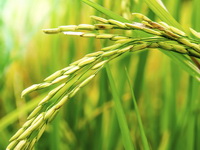
Researchers Find Out Why Rice Can't Get Along with Other Plants
May 20, 2015| |
 Researchers in the Jander laboratory at Boyce Thomson Institute for Plant Research (BTI) have discovered a new compound in certain rice varieties that may slow the growth of nearby plants. The research team, composed of researchers from the Chinese Academy of Sciences, Yamagata University and Kyoto University in Japan, and Cornell University, identified the compound, called b-tyrosine. It curtails root growth in other plants in laboratory tests, and may also have antibacterial properties.
Researchers in the Jander laboratory at Boyce Thomson Institute for Plant Research (BTI) have discovered a new compound in certain rice varieties that may slow the growth of nearby plants. The research team, composed of researchers from the Chinese Academy of Sciences, Yamagata University and Kyoto University in Japan, and Cornell University, identified the compound, called b-tyrosine. It curtails root growth in other plants in laboratory tests, and may also have antibacterial properties.
According to BTI Professor Georg Jander, b-tyrosine was completely unknown as a rice metabolite or even as a plant metabolite. He suspects that rice plants use b-tyrosine for allelopathy. b-tyrosine could reduce root growth in multiple different plant species. Rice varieties that generate b-tyrosine, as well as other grasses, were immune to its effects, but the compound was especially effective against dicots.
The researchers used genetic mapping to show that b-tyrosine biosynthesis is encoded on rice chromosome 12, where they discovered the responsible gene, called TAM1. It encodes tyrosine aminomutase, an enzyme that converts a-tyrosine into b-tyrosine. They also found b-tyrosine in a majority of the japonica, or short-grain, varieties that they tested, but the compound was absent in the long grain indica and aromatic varieties.
For more information, read the news release at the BTI website.
| |
Biotech Updates is a weekly newsletter of ISAAA, a not-for-profit organization. It is distributed for free to over 22,000 subscribers worldwide to inform them about the key developments in biosciences, especially in biotechnology. Your support will help us in our mission to feed the world with knowledge. You can help by donating as little as $10.
-
See more articles:
-
News from Around the World
- Field Trips for Transgenic Wheat Plants in Egypt
- Kenyan Scientists Embrace Social Media
- US EPA Approves Wider Testing of Spinach Defenses Against Citrus Greening
- Researchers Find Out Why Rice Can't Get Along with Other Plants
- Pakistan Agriculture Research Council Recommends Eight New HYV Maize
- Research and Markets Releases Report on Thailand Seed Industry Outlook
- Research Finds Mechanism of Herbicide Resistance
- USDA FAS Releases Turkey Agri-biotech Report
- Evaluating European Consumer's WTP for Cisgenic and Transgenic Rice
-
Research Highlights
- Scientists Reveal Multiple Gene Silencing Pathways Involved in Horizontal Transmission
- Enhancement of Somatic Embryogenesis in Theobroma cacao through TcBBM Overexpression
- Insect-specific MicroRNA, an Alternative to Bt-Toxin Technology in Engineering Insect Resistance
-
Beyond Crop Biotech
- Genes Associated with Morning and Evening-Like Behavior Identified
-
From the BICs
- UBIC Concludes Regional Sensitization Fora on Modern Agro-biotech Research in Uganda
- ISAAA Report Launched in Swaziland
-
Read the latest: - Biotech Updates (January 28, 2026)
- Gene Editing Supplement (January 28, 2026)
- Gene Drive Supplement (February 22, 2023)
-
Subscribe to BU: - Share
- Tweet
